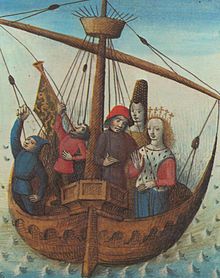Isolde

Isolde , also Isolda , is a female given name .
Origin and meaning
The etymology of the name Isolde is not certain. A Germanic origin of the hypothetical Franconian names Ishild or Iswalta as a combination of isan , iron, with hiltja , fight or waltan , was discussed . This is opposed by other authors who, due to the geographical origin of the Tristan saga, advocate an island Celtic etymology and who have been using it since the 6th century. proven name Cornish donkey as well as the Cymrian name Isoldes in the Welsh Triads , Esyllt . In this context it is pointed out that a Celtic name could also go back to a Germanic model. The fact that Isolde's father Gurmun bears a Germanic (Vandalic) name also speaks for the Germanic origin .
Tristan legend
Isolde of Ireland is the eponymous heroine of the courtly novel by Tristan and Isolde . The Dragonslayer Tristan advertises Isolde as a bride for King Marke of Kurnewale (in French Tristan fabric Cornwall from the Latin 'Cornu Galliae.'; Might mean Cornwall or the likewise as Cornu Galliae called Brittany ). Due to tragic entanglements and a love potion accidentally taken together, they both fall in love. In the course of the novel, they are separated from each other. Tristan gets to know Isolde Weißhand in a foreign country and marries her because she reminds him of "his" Isolde. Isolde, meanwhile, lives sadly with King Marke. Wounded to death after a fight, Tristan has the healing Isolde called to him. She comes to save him, but shortly before she arrives, Tristan takes her own life. When Isolde sees the dying man, she too kills herself by throwing herself into Tristan's sword.
The story of Isolde's loyalty to death has been passed down in numerous arrangements since the high Middle Ages, including in the opera Tristan und Isolde by Richard Wagner .
Name days
The name days are August 23 and August 24 .
variants
- ancient Germanic Ishild
- Middle High German Isold, Isalde
- French Iseult , Yseult from old French Iseut
- Italian Isotta
- Celtic languages: Ysolt , Cornish Eseld , Welsh Esyllt, Essyllt
- Polish Izolda
- international: Isolda
Name bearers (both forms)
- Isolde Ahlgrimm (1914–1995), Austrian harpsichordist
- Isolda Dychauk (* 1993), German actress
- Isolde Heyne (1931–2009), German writer
- Isolde Holderied (* 1966), German racing driver
- Isolde Kostner (* 1975), Italian ski racer
- Isolde Kurz (1853–1944), German writer
- Isolde Liebherr (* 1949), entrepreneur
- Isolde Ohlbaum (* 1953), German photographer
- Isolde Oschmann (* 1913), German politician
- Isolde Ries (* 1956), German politician
- Isolde Saalmann (* 1943), German politician
- Isolde Schaad (* 1944), Swiss writer
- Isolde Schmitt-Menzel (* 1930), German graphic artist and author
Individual evidence
- ^ G. Weber and W. Hoffmann: Gottfried von Straßburg . Stuttgart, J. B. Metzlersche Verlagsbuchhandlung 1981, page 32.
- ^ Uta Störmer-Caysa: Basic structures of medieval narratives: space and time in the courtly novel . Berlin / New York, Walter de Gruyter, 2007. page 46.
- ↑ Arthur Schurig: The novel by Tristan and Isolde in the original Breton form. Paul Aretz Verlag, Dresden 1923
- ↑ a b c d e f g Isolde ( en ) Retrieved on November 17, 2011.